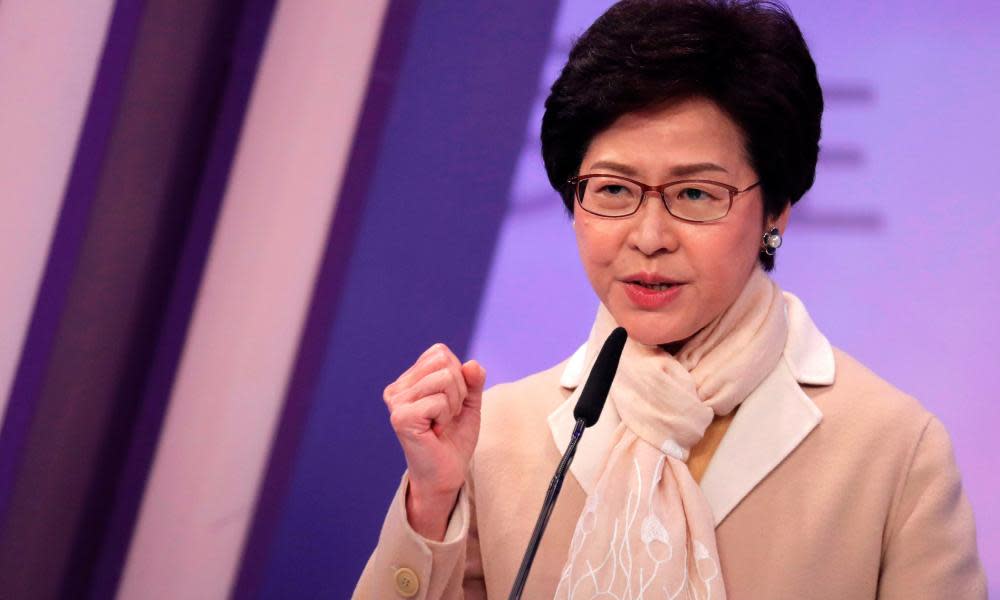Hong Kong faces 'selection not election' of China's favoured candidate

Every newly elected leader of Hong Kong takes the oath of office in front of China’s president, below a giant red national flag of China, and the slightly smaller banner of the city.
It is a tightly scripted event designed to shield Chinese officials from the embarrassment of dissenting voices.
In Hong Kong politics, formality is everything, and many say the election for the city’s next leader which happens on Sunday will indeed be a formality.
Most expect Beijing’s preferred candidate to be anointed despite her rival being by far the more popular choice.
The race for the top job, officially known as the chief executive, is largely between two retired civil servants. Carrie Lam was the deputy to the present chief executive, Leung Chun-ying, and is supported by the Chinese government. John Tsang, a former financial secretary, consistently polls ahead of her by a wide margin.
A third candidate is also running, retired judge Woo Kwok-hing, who is neither popular nor politically connected in Beijing.
However, only 1,194 people are able to cast a ballot, far less than the city’s 3.8 million registered voters. Those who have a say include all 70 members of the city’s legislature and some district politicians, business groups, professional unions, pop stars, priests and professors.
“This is entirely controlled by the Beijing government, it’s a selection, not an election,” says Nathan Law, a pro-democracy legislator swept into office in the wake of 2014 street protests agitating for more open elections.
It will be hard for her [Carrie Lam] to govern because she doesn’t have the support from ordinary people.
Nathan Law, legislator
“If Carrie Lam wins, it will be hard for her to govern Hong Kong because she doesn’t have the support from ordinary people.”
The idea that Sunday’s vote is indeed “a selection, not an election” is a mantra repeated across the political spectrum, with many dismayed that citizens in the former British colony have no say in who runs the city.
The Basic Law, Hong Kong’s mini constitution, explicitly states: “The ultimate aim is the selection of the chief executive by universal suffrage”. A political change package pushed by Beijing in 2014 would have allowed a “one person, one vote” system, but candidates would first need to be approved by a committee.
That pre-screening was criticised by pro-democracy activists, eventually erupting into 79 days of street protests that consumed the city.
“I don’t see much of a difference, comparing Lam to CY Leung,” said Law, one of the leaders of those protests. “She’s also responsible for the failure of political reform and the impression she has given during the campaign is that she will be a hardliner.”
Law, who as a legislator is able to vote, plans to submit a blank ballot in protest against Beijing’s outsized influence in the decision and the “small circle” nature of the election.

In the weeks leading up to the vote, the city hardly feels gripped by a battle for hearts and minds. There are no mass political rallies, with much of the electioneering done in closed-door meetings with special interest groups and only a sprinkling of subdued political advertisements around the city.
Most Hong Kongers have not been debating the candidates over dinner or pints at the pub, and many are resigned to the fact their opinion has no effect on who wins. “I don’t see the point in even holding an election, the whole thing has already been decided by China,” said Lam Ho-wai, a 26-year-old real estate agent.
Hong Kong’s youth are the main drivers behind dissatisfaction with the current state of affairs. As property prices skyrocket and job opportunities become scarce, more and more young people blame politicians they see as serving only Beijing. This has dovetailed with a rise in a Hong Kong identity many see as separate from China.
“It’s important to China to have a chief executive who could somehow draw the younger generation closer to the central government,” says Michael Tien, a pro-establishment legislator. “I believe John Tsang will be much more effective in dealing with the youth problem compared to Carrie Lam, and I’m surprised and disappointed that the central government feels it’s not that important.”
In December, Tien was approached by someone “very close to Beijing” and encouraged to support Lam for the top job, he said.
Hong Kong’s chief executive office has never been without scandal. Tung Chee-hwa, the first ethnically Chinese person to run the city, resigned in the wake of mass protests against proposed national security legislation and the Sars outbreak. Donald Tsang, who succeeded Tung, was convicted of corruption last month.
In many ways it’s a thankless job, and in the highly polarised world of Hong Kong politics, every misstep is a tempest in a teacup.
But no matter who wins, observers say little will change in terms of political culture. “The big picture will remain the same,” says Matthew Wong, a politics professor at Hong Kong University. “Beijing has matters firmly in hand and there’s little Hong Kong people can do to change that.”

 Yahoo News
Yahoo News 
